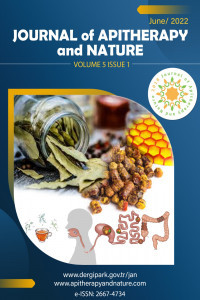In vitro Assessments of Cytotoxic and Cytostatic Effects of Propolis in Cells from the Human Colon Carcinoma Cell Line (HCT 116)
In vitro Assessments of Cytotoxic and Cytostatic Effects of Propolis in Cells from the Human Colon Carcinoma Cell Line (HCT 116)
Cytostatic Effects, Propolis, In vitro,
___
- .
- Yayın Aralığı: Yılda 2 Sayı
- Başlangıç: 2018
- Yayıncı: Oktay YILDIZ
The Immune Modulatory and Anti-protozoal Effects of Different Propolis Samples
David G. WATSON, Harry de KONING, Godwin EBILOMA, John IgoLI, Weam SIHERI, Naif ALENZI, Samyah ALANAZI, Sameah ALENEZI, William HARNETT
A Collaborative Study for Performance Evaluation of Analytical Methods for Propolis. An IHC Trial
M. LOPES, A. PEREYRA, C. KUNERT, G. BECKH, H. SCHREITER, O. G. ÇELEMLI, K. SORKUN, S GEORGÉ, L. PAULO, S. GARDINI, M.t SANCHO, V. BANKOVA, T. DASTAN, C. TANANAKI, L.f. NUNES, M. VILAS-BOAS
Effects of Propolis on the Quorum Sensing of Selected Biofilm Producing Bacterial Species
K. TENNICK, S. WAFA, H. FEARNLEY, M. GOMEZ ESCALADA
Propolis from Romania and Turkey: Comparative Antioxidant and Antibacterial Activity
Otilia BOBIS, Merve KESKIN, Saban KESKIN, Sevgi KOLAYLI, Mihaela NICULAE, Adriana URCAN, Claudia PASCA, Liviu Al. MĂRGHITAS, Daniel S. DEZMIREAN
Determination of Phenolic Acids in Raw Propolis Using Near Infrared Spectroscopy
Ana María VIVAR-QUINTANA, İsabel REVILLA, María İnmaculada GONZÁLEZ-MARTÍN, Eddy Valentín BETANCES-SALCEDO
Direct Visualization of Artepillin C into Fibroblast Cells via CARS Microscopy
Wallance M. PAZIN, Vita SOLOVYEVA, Tibebe LEMMA, Bjarke JØRGENSEN, Carlos José L. CONSTANTINO, Jonathan BREWER
Determination of Propolis Origin Using Phenolic Composition and Artificial Neural Networks
İsabel REVILLA, Ana María VIVAR-QUINTANA, Pedro HERNÁNDEZ-RAMOS
Ahmad SULAEMAN, M MAHANI, HARDINSYAH HARDINSYAH, E DARMA, S. R. MUBAROKAH, N NURJANAH
Yoga Bee, a New Approach for Health
Isolated Xanthones from Lisotrigona furva Propolis in Vietnam
Le Nguyen THANH, Ha Thi THOA, Vu Thi Kim OANH, Diep Thi Lan PHUONG, Hoang Thi VAN, Nguyen Quynh CHI, Tran Huu GIAP, Nguyen Thi Tu OANH, Nguyen Thi Minh HANG, Nguyen Van HUNG, Chau Van MINH, Vassya BANKOVA
